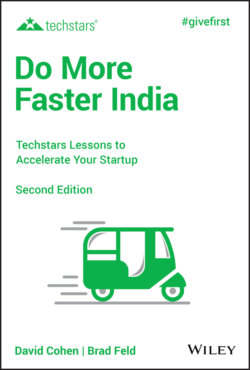Читать книгу Do More Faster India - Sacca Chris, Chris Sacca, Brad Feld - Страница 19
ОглавлениеChapter 3 Trust Me, Your Idea Is Worthless
Tim Ferriss
Tim is the best-selling author of The 4-Hour Workweek, The 4-Hour Chef, The 4-Hour Body, Tools of Titans, and Tribe of Mentors, as well as an entrepreneur and angel investor in companies such as Uber, Facebook, Shopify, Duolingo, Alibaba, and 50-plus others. He has been listed as one of Fast Company’s “Most Innovative Business People” and one of Fortune’s “40 under 40.” Starting in 2008, Tim became a Techstars mentor and is an investor in several Techstars companies, including DailyBurn, Foodzie, and Grove.
Earth-shattering and world-changing ideas are a dime a dozen. In fact, that’s being too generous.
I’ve had hundreds of would-be entrepreneurs contact me with great news: They have the next big thing, but they can’t risk telling me (or anyone else) about it until I sign some form of idea insurance, usually a nondisclosure agreement (NDA). Like every other sensible investor on the planet, I decline the request to sign the NDA, forgoing the idea, often to the shock, awe, and dismay of the stunned entrepreneur.
Why do I avoid this conversation? Because entrepreneurs who behave this way clearly overvalue ideas and, therefore, almost by definition, undervalue execution. Brainstorming is a risk-free, carefree activity. Entrepreneurship in the literal sense of “undertaking” is not. Strap on your seat belt if you’re signing up for a startup. It’s a high-velocity experience.
If you have a brilliant idea, it’s safe to assume that other very smart people are working on the same thing or working on a different approach to solving the same problem. Just look at the number of different travel apps on your iPhone or the number of diet and exercise sites on the Web for an example of this.
Overvaluing the idea is a red flag, particularly in the absence of tangible progress. Sure, with this attitude I miss out on investing in some truly great ideas, but that’s okay with me: I don’t invest in ideas. Neither does Warren Buffett. I’ll lose less money than those who do. I can largely control my downside by investing in good people who, even if they fail this go-round, will learn from mistakes and have other fundable ideas (ideas I’ll likely have access to as an early supporter). I do not have this advantage when investing in ideas.
One popular startup dictum worth remembering is “One can steal ideas, but no one can steal execution or passion.” Put in another light: There is no market for ideas. Think about it for a second: Have you tried selling an idea lately? Where would you go to sell it? Who would buy it? When there is no market, it is usually a very sure sign that there is no value.1
Almost anyone can (and has!) come up with a great idea, but only a skilled entrepreneur can execute it. Skilled in this case doesn’t mean experienced; it means flexible and action-oriented, someone who recognizes that mistakes can often be corrected, but time lost postponing a decision is lost forever. Ideas, however necessary, are not sufficient. They are just an entry ticket to play the game.
Don’t shelter and protect your startup concept like it’s a nest egg. If it’s truly your only viable idea, you won’t have the creativity to adapt when needed (and it will be needed often) in negotiating or responding to competitors and customers. In this case, it’s better to call it quits before you start.
Focus on where most people balk and delay: exposing it to the real world. If you’re cut out for the ride, this is also where all the rewards and excitement live, right alongside the 800-pound gorillas and cliffside paths. That’s the fun of it.
David didn’t beat Goliath with a whiteboard. Go get amongst it, and like the best boxers, prepare to think on your feet, bob and weave, and quickly adapt.
I had a friend who read this chapter and said, “I vehemently disagree that ideas are worthless. Everything that’s ever been created in the world started as an idea—Beethoven’s Ninth Symphony, Robert Naismith’s invention of basketball. I don’t think those are worthless ideas.” Yes, that’s true. But there’s no market for ideas, there’s no website, nor any company in the world, where you can share an idea and get paid for it. An idea needs a person behind it, and some action, to become valuable. Without those, an idea is, well, just an idea.
What about all those “great” ideas we fund at Techstars? Well, about half of the companies who go through Techstars tell us that they have a “substantially or completely different” idea and product that they’re building after the three-month program ends, compared to when they first walked in our doors. When the founders of DigitalOcean applied to Techstars, they had an idea around helping developers navigate complex infrastructure. We loved the founders but hated the idea. They were already contemplating changing their idea when they arrived in Boulder in the summer of 2012 but were nervous about what our reaction would be. They quickly heard that we believed in them, but not their idea, and aggressively changed course. Alex White, the CEO of Next Big Sound, talks more about this in the chapter “Fail Fast.” The willingness to change your idea based on data is the sign of a strong entrepreneur, not a weak one.2
Notes
1 1Yes, there are a few exceptions, like licensing IP, but IP is “property,” as distinct from an unprotectable thought.
2 2Text boxes throughout Do More Faster provide additional commentary by David and Brad.
